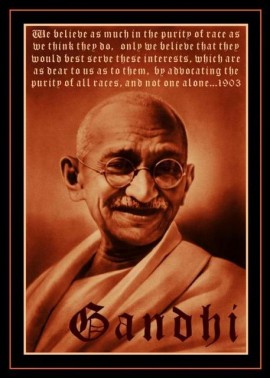
by Kevin Alfred Strom
MY RECENT ARTICLE on Mahatma Gandhi has created some interest, and has been reprinted not only by the Historical Review Press in Britain, but also by John de Nugent and by Ironlight, a site whose motto is ‘illumination in the dark age.’ Ironlight also apparently commissioned an illustration especially for the article by the talented artist (and writer) Harold Arthur McNeill, which you can see here.
I also received a few letters disagreeing with my proposition that Gandhi was consistent in his belief in self-determination, and that therefore “equality” under multiracialism could not have been his ideal. One of the more intelligently-written dissenting letters was from a Mr. Allen, who wrote:
‘Gandhi’s remarks have less to do with asserting the need for racial purity than they do assuaging a British (and World) public that a) Indians share the values of the West, and b) Indians do not seek to “contaminate” white genes.’
‘Leaders often have to form arguments that identify common ground with their oppressors. In terms of argument, Gandhi was trying to show that the Brits could follow their own logic (anti-miscegenation) to justify their leaving India. Elsewhere in Gandhi’s writings, you do not see this emphasis on racial purity. It is an opportunistic argument used to persuade an opponent, and also to argue an equality between whites and Indians, that the genetics of both are worth preserving.’
If what Allen says is true, then Gandhi was yet another opportunistic politician, saying one thing one day and another contradictory thing the next, depending on his audience, in a cynical attempt to get what he wants at the moment. Even if that is true, which I doubt, Gandhi still spoke the truth when he told the world in his newspaper articles that (in Mr. Allen’s words) the genetics of both Indians and Europeans are worth preserving. (Mr. Allen is also incorrect in stating that Gandhi was expressing the anti-miscegenation ideas I quoted in order to persuade Britain to leave India. At the time, Gandhi was in South Africa and primarily concerned with the position of Indians there.)
If Mohandas Gandhi deëmphasized race in his later works, after his return to his homeland, that’s understandable considering the vastly different racial, religious, political, and cultural landscapes of South Africa and India. If he disavowed his statements on race or self-determination, that would be a different story — but I have seen no evidence of that.
It is true that Gandhi at times seemed to view the world through rose-colored glasses — as in his strong desire to believe that all the natives of Imperial British India were one people, or that Jews were just a variety of European (as when he called them “the untouchables of Christianity”), or, for that matter, that all policemen in an ideal future India would be “believers in nonviolence.” But when he expressed himself on the Zionist efforts to take Palestine, he not only came down on the side of the native Arabs, but his words resonate with those of Jean-Marie Le Pen and Nick Griffin in calling for France for the French and England for the English. Gandhi wrote these words in 1938 — almost four decades after the statements on race I quoted earlier:
‘Palestine belongs to the Arabs in the same sense that England belongs to the English or France to the French. It is wrong and inhuman to impose the Jews on the Arabs. What is going on in Palestine today cannot be justified by any moral code of conduct.’
It’s important that we help spread the truth about Gandhi, because once good-hearted and well-meaning people understand 1) that this man wanted freedom and independence for his people, not “equality” under centralized rule like his polar opposite “Martin Luther King,” and 2) that the version of history they are given in the schools and the mass media has been distorted for crass political purposes, some of them will begin to think for themselves.
Gandhi's remarks have less to do with asserting the need for racial purity than they do assuaging a British (and World) public that a) Indians share the values of the West, and b) Indians do not seek to "contaminate" white genes. Leaders often have to form arguments that identify common ground with their oppressors. In terms of argument, Gandhi was trying to show that the Brits could follow their own logic (anti-miscegenation) to justify their leaving India. Elsewhere in Gandhi's writings, you do not see this emphasis on racial purity. It is an opportunistic argument used to persuade an opponent, and also to argue an equality between whites and Indians, that the genetics of both are worth preserving.
